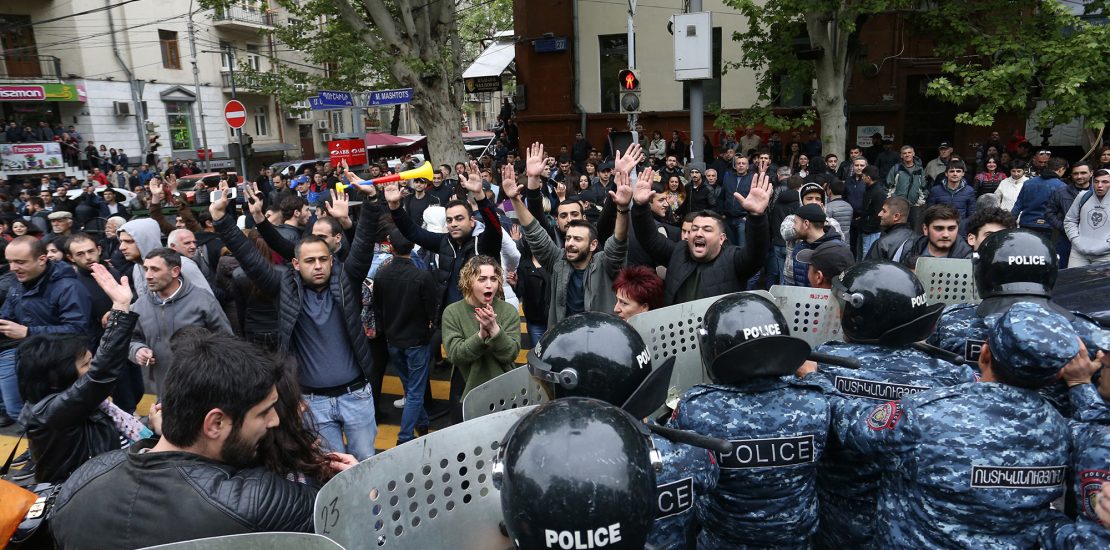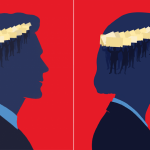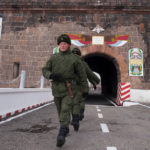- 5 February, 2021
- Democracy and Human Rights

In February 2021, The Economist Intelligence Unit published the Democracy Index 2020 report, where Armenia’s index declined from 5.54 to 5.35 compared to 2019 (you can read the full report here).
First of all, it should be noted that for Armenia this index was higher than the one in 2020 only in 2019 (in 2018 it was 4.79, and before that it was even lower). Although the authors of the report attribute the index retreat to the restriction of rights on the basis of the martial law declared as a result of the war, however, we will try to understand which rights in particular were restricted by the Armenian authorities in 2020 and when exactly this took place.
The somewhat disproportionate restriction of rights was noted during the emergency situation conditioned by the COVID as well as during the martial law declared as a result of the military aggression initiated by Azerbaijan. Moreover, some restrictions were used without any formal basis.
It should be noted that here we refer only to the systematic restrictions of rights by the Armenian authorities; we do not refer to the unique cases of restrictions, just as we do not refer directly to the violations of the rights arising from the aggression of Azerbaijan.
Freedom of Speech
In 2020, freedom of speech was restricted twice. The first restriction was at the beginning of the state of emergency from March 16 to April 13. Restrictions on freedom of speech were criticized at the time by both civil society and the international community (CoE Commissioner for Human Rights, OSCE Commissioner for Freedom of Speech, etc.).Weeks later, the censorship rules were eased, and on April 13, they were lifted altogether.
The next restriction on freedom of speech was introduced under martial law on September 27, 2020, and tightened on October 8. Shortly after the end of the war, on November 20, this restriction of the right was lifted by the Constitutional Court through the mediation of the Human Rights Defender, and on December 1, it was declared invalid in the National Assembly.
It was a natural practice to restrict freedom of speech during martial law, however the issue was in the extent of the restriction. For example, a ban on publishing the movement of military equipment is obviously reasonable, but it is not reasonable to ban valid publication that criticizes the government or tells about the real losses. The mentioned ban, for example, led to public distrust towards government decisions (in particular in case of the joined statement signed on November 9, 2020).
Freedom of peaceful assembly
Freedom of assembly was also restricted twice *.
The right of assembly under the state of emergency was completely lifted on March 16. Since June, 2020 the civil society and the Public Council had been proposing to allow rallies with reasonable anti-epidemic restrictions. However, the government took this step only on August 12, 2020, when it allowed peaceful assembly with reasonable and proportionate restrictions.
The right to peaceful assembly has also been banned under martial law on September 27. No matter how we evaluate the proportionality of the ban on this right in residences that were far from hostilities during the war, we note that it could not be considered proportionate after the end of the war. Nevertheless, the ban was lifted only on December 1, 2020, by the National Assembly.
*Although within the quarantine announced on September 12, 2020, there is a restriction on the right to peaceful assembly, nevertheless it is reasonable and proportionate.
The right to elect a government
The constitution prohibits holding any kind of election during a state of emergency or martial law. As a result, since March 2020, there have been no local elections in Armenia in Ijevan, Stepanavan, Lermontovo and other communities (where they were supposed to take place).
In the mentioned communities, the heads of the previously elected communities and councils of elders continue to hold office, which, of course, is problematic. Reasonably, elections could have been held in those communities in August-September or in the winter, but this did not happen for formal reasons.
Restriction on freedom of information
Restrictions on freedom of information were not envisaged under either the state of emergency nor martial law. However, during the martial law, it was in fact restricted without legal grounds.
Public administration bodies, without a legal basis or reasonable logic, both during the war and to this day, keep secret certain information (or provide false information) about the wounded, the victims, the territorial losses in Artsakh, the circumstances underlying a number of important decisions, and other issues.
Restriction on the right to strike
The right to strike was completely restricted twice: completely in parallel with the freedom of assembly and during the exact same period. However, the complete restriction of the right to strike during the state of emergency was disproportionate, as a strike without a rally could in no way be a source of infection.
For this reason, in June the Public Council proposed to limit the right to strike only in those institutions that have a significant role in combating the epidemic.
However, it should be noted that no case of employees trying to go on strike has been prevented by the police or other government officials.
Daniel Ioannisyan
Union of Informed Citizens




